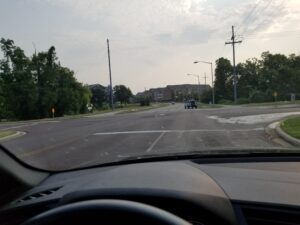The late Milton Friedman could have been thinking about the City of Overland Park when he said, “when a man spends someone else’s money on someone else, he doesn’t how much he spends or what he spends it on. And that’s government for you.”
This week, Overland Park is installing two mini-roundabouts in my neighborhood that they say is “only” about $400,000 each to mitigate traffic backups, one at a 4-way stop and the other at a 2-way stop. The stated purpose is to reduce wait times during morning and evening rush hour. But the project is a shining example of Friedman’s quote about spending someone else’s money.

City engineering officials tell me the project was approved as part of the 2019 Capital Improvements Program. The thinking then was that the intersection delay at the 132nd and Foster intersection would decrease by more than a minute and a half per vehicle in the morning peak hour and by more than one and three-quarters of a minute per vehicle in the evening peak hour with mini-roundabouts. Wait times at the 133rd and Hemlock intersection were expected to decline a little less than a minute in the morning and slightly more than a minute and a half in the evening.
I have lived in that neighborhood for over four years and have rarely experienced intolerable wait times and certainly nothing that justifies spending $800,000 of other people’s money. That was the case pre-COVID and traffic has declined significantly now with a lot of people working from home.
City officials acknowledge that traffic has probably declined but they didn’t do another study, so I ran my own random experiment last Thursday. My wait was only 15 seconds at the Foster intersection and it was 58 seconds at the Hemlock intersection around 5:10 pm. But the adjacent photo shows traffic was gone a few minutes later at Hemlock. That was the only day I timed my waits but that experience is it fairly typical post-COVID.
Planning ahead is good, but not revisiting the necessity of a mini-roundabouts project approved years ago is not a good use of taxpayer money. But that is frequently how things are done in government. Spending is driven by a schedule more than by need; computers, vehicles, and other things are replaced according to a pre-determined schedule. I’m told of one school district that replaces carpeting every three years.
Taxes and spending out of control in Overland Park
The City of Overland Park is able to spend money without worrying about necessity because City Councils over the years increased property taxes far more than necessary.
Property tax has increased by 320% since 1997, which is more than three times the combined rates of inflation and population. For perspective, residents and businesses would be paying 32% less this year – about $29 million – if property tax was increased for inflation and population.

This year, City Council is proposing a 10.7% property tax increase and a whopping 39% spending increase. It will be interesting to see what taxpayers have to say about that at the Truth in Taxation hearing scheduled at City Hall on September 13 at 7:30 pm. Thanks to legislation passed this year, local officials have to vote on the entire property tax increase they impose; no longer can they claim to ‘hold the line’ on property tax while raking in huge gains from valuation changes.
Overland Park officials are singled out here because this unnecessary spending on mini-roundabouts is an easy story to tell, but waste like this is rampant across Kansas.
For example, taxpayers in Finney, Ford, and Seward counties have been hit with enormous property tax increases while local government jobs grew much faster than population. Population declined in Seward County by 5% between 2001 and 2019 but funded by an 84% property tax hike, local government jobs increased by 16%.

Runaway government spending and taxation play a big role in economic stagnation, and not just in rural Kansas. Even Johnson County lost over $300 million in adjusted gross income over the last five years because more money moved out than moved in.
Truth in Taxation hearings will be held between August 20 and September 20. Kansas Policy Institute and the Sentinel will soon publish dates and times for hearings in cities, counties, and school districts; stay tuned to find out about your hearings so you can tell officials what you think about runaway spending and taxation.



